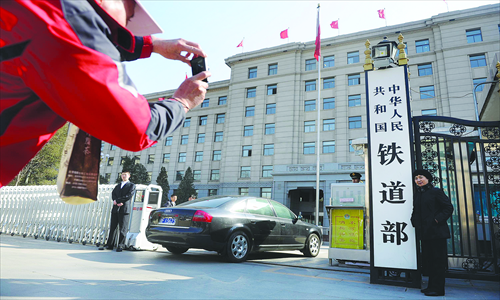Govt shake-up for efficiency

The State Council unveiled its restructuring plan for the government on Sunday, unifying China's maritime law enforcement bodies and reorganizing several other government agencies in a bid to boost efficiency.
The number of ministries under the State Council will be reduced from 27 to 25, while several departments, including the Ministry of Railways, Food and Drug Administration and the National Family Planning Commission, will be reshuffled under the plan, which was submitted at the national legislative session.
The reforms, which usher in the biggest reduction in ministries since 1998, come amid growing public concern over maritime disputes, the country's controversial family planning policy, food and drug safety and government transparency.
Maritime bodies unified
One of the biggest reforms involves unifying maritime law enforcement forces under the country's top oceanic administration.
The newly restructured State Oceanic Administration (SOA) will take over coast guard management from the public security ministry, fishery patrols under the agriculture ministry and customs marine anti-smuggling operations.
The move aims to "safeguard the country's maritime rights and interests," State Councilor Ma Kai said when deliberating the institutional restructuring plan at the National People's Congress (NPC) session.
"The effectiveness of law enforcement is not high, and the ability to defend rights is inadequate," said Ma, noting that the new administration will carry out law enforcement duties in the name of China's maritime police bureau and under the operational direction of the public security ministry.
The sweeping reforms come at a time when China is intertwined in a spat with Japan over the Diaoyu Islands in the East China Sea. Li Jie, a senior captain at the Chinese Naval Research Institute, said territorial tensions were "part of the reason" for the SOA shake up.
"Scattered maritime law enforcement bodies among different departments are both chaotic and inefficient. The [Diaoyu Islands] dispute merely exposed this problem," Li told the Global Times.
"China now faces a complicated situation in maritime diplomacy. These reforms will help China better safeguard its sovereign integrity," he said.
'Further research' on family planning
In another departmental reshuffle, the existing Ministry of Health will merge with the National Population and Family Planning Commission and transfer its mandate of drafting future population policies to the National Development and Reform Commission (NDRC), China's top economic planning body.
"This shows China attaches great importance to its population growth and views it as a key factor in social and economic development," said Ma Xiaohe, deputy chief of the Academy of Macro-economic Research with the NDRC.
China's working-age population declined for the first time in more than three decades in 2012, according to a report from China's National Bureau of Statistics on February 22. The report also found the country's demographic dividend that helped drive rapid growth had finally come to the turning point.
Meanwhile, more people have joined the discussion of whether China should revoke the current family planning policy to maintain the nation's vitality and global economic competitiveness.
"China needs top-down guidance on its population policy to rule out potential problems in its future demographic structure," said Ma Xiaohe, adding that the country's aging society is a chief concern for policymakers. "Population control requires further and thorough research."
The report, however, stressed that China will adhere to and improve the family planning policy once reforms take effect.
Liang Zhongtang, a demographic professor at the Shanghai Academy of Social Sciences, said a "one-child policy" is still prevalent among many Chinese families.
"The merge with the health ministry is in fact making the family planning body more powerful," said Liang.
Improving food and drug safety
The State Council plans to elevate the existing State Administration of Food and Drug (SAFD) to step up supervision.
Ma also announced that the Ministry of Railways will be dissolved into administrative and commercial arms to separate its controversial status as both railway service provider and watchdog.
Experts hailed the move as a "landmark" reform that signals a shift in the railway industry going from a planned to market economy.
"It will open another door for financing and management of the railway sector," said Wang Yiming, deputy head of the Academy of Macroeconomic Research at the NDRC.
Other experts said the reforms address mounting public calls for improved government transparency and efficiency.
"The SAFD's reform plan reflects demands among people for safe food, which in turn demands good public management," said Zhang Yongjian, a food safety researcher at the Chinese Academy of Social Sciences.
Both the issue of food safety and functionality of railways affect the lives of hundreds of millions of Chinese, noted Yang Yu, a researcher with the urban development center at the NDRC.
"The State Council has launched a bold reform plan. The key point is not about the number of agencies being reduced but whether the government is truly able to pass reforms ... as it claims in the plan," Yang wrote on his Sina Weibo account.
Ni Wei and agencies contributed to this story
